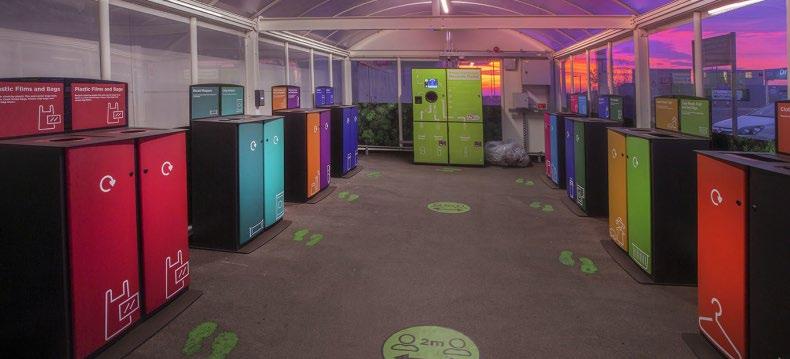
4 minute read
COVID-19 UPDATE
SCOTTISH HOSPITALITY CLOSURE EXTENDED BY A WEEK
BARS AND RESTAURANTS IN SCOTLAND’S CENTRAL BELT WILLREMAIN CLOSED FOR ANOTHER WEEK AFTER SHORT-TERMRESTRICTIONS WERE EXTENDED.
The two week short-term closure of the hospitality industry in Scotland’s central belt has been extended by another week as a further 28 deaths linked to Covid-19 have been recorded.
Scotland is due to move to a five-tier system of virus alert levels from 2 November with the extended hospitality closures enabling “a smooth transition”.
These measures were originally meant to expire on 26 October, but First Minister Nicola Sturgeon said they would now continue until a new “strategic framework” comes into force.
The five-tier system will see different levels applied nationally or regionally depending on infection levels. Sturgeon said the middle three tiers would be “broadly equivalent” to the three-tier system in England but the Scottish system would add an extra tier at the top and an extra one at the bottom which would be very close to a full lockdown.
CONSUMER MOVEMENT DROPS AS LOCKDOWN BITES
THE LATEST CACI CUSTOMER MOVEMENT TRACKING STUDY SHOWS CONSUMER MOVEMENT CONTINUING TO FALL AS RESTRICTIONS TIGHTEN.
The latest CACI Customer Movement tracking study for the week ending 11 October shows another drop in consumer movement as lockdown restrictions tighten. Mobility reduced by a further 2% on the previous week with regional lockdowns encompassing over 50% of the population.
The largest declines are in the North West, Northern Ireland and the North East while Wales restricted movement earlier than the English regions and has now become the least mobile region in the UK, below London for the first time since early June.
Even within London there is a clear divide between the north and west of the city with above average mobility, and the south and south east, which sit below the UK average.
The least affluent groups have reduced their movement most this week, a function of their greater presence in the regions impacted by lockdown and because the more cautious affluent groups were more able to start to limit their movement earlier.
The impact on shopping and leisure destinations is universal, with all centre types declining this week, continuing to reverse earlier gains.
POST OFFICES ‘A LIFELINE’ TO STRUGGLING HIGH STREETS

New research carried out among more than 2,000 adults by Public First has found that visits to the Post Office help drive another 400 million visitors to other shops, restaurants and local businesses.
Some 33% of respondents said that on their last trip to the Post Office they had stopped at another shop, cafe, pub or restaurant, driving an estimated £1.1bn in additional revenue. Additionally, 43% of small businesses say they would not be able to continue functioning without the Post Office.
The research showed that 82% of the public see their local Post Office as an essential service, with young people valuing it almost as much as older people. A Post Office came out as the top choice when respondents were asked what would make up their ideal High Street – far ahead of supermarkets or a GP surgery.
SMALL BUSINESS CONFIDENCE INCREASING
Despite the impact of Covid-19 on much of the retail sector, the proportion of small retail businesses predicting growth for the next quarter rose from 27% in Q3 of this year to 35% ahead of the critical Christmas period, according to the latest findings from the rolling Hitachi Capital Business Finance study.
This quarter, small retail firms were more optimistic about their growth plans than they were pre-pandemic in Q1 2020 when just 31% of small retailers foresaw modest or significant growth in the months ahead. This is the best growth outlook figure for small retail businesses since Q4 2019 when 39% of retail SMEs predicted growth.
The top priorities for small businesses to secure growth for 2021 were increasing new business income/sales (39%), diversifying the business by offering new lines of services and products (36%) and reducing fixed costs (24%).
CONTACTLESS CHARITY DONATION
TapSimple is a simple, pocket-size device that pairs with a smartphone and can be used to help charity fundraising efforts in-store by allowing shoppers to quickly and conveniently donate money with zero contact.
Shoppers simply tap their card, as they do with normal contactless transactions, and donate set or tailored amounts. The solution is fully customisable and comes with a back office dashboard for retailers to track and analyse donations.
The service is currently being used by Lidl to raise money for NSPCC.
For more info, visit tapsimple.org.
GROCERYAID IN DEMAND
Industry charity GroceryAidsays it is facing increaseddemand for services as thepandemic presents newchallenges. The charity hadto assist more than 17,000people during the period anddistributed £4.25m in financialsupport to help almost 3,200colleagues.
LEARNING FUNDING CUT
Retail trade union Usdawhas written to the Secretaryof State for Education urgingthe Government to reconsiderits shock announcement towithdraw all funding for theUnion Learning Fund from theend of March 2021 in England.The union said the the fundingcut was “shocking”.
CO-OP BRUM STORES
The Co-op is to open two foodstores in Birmingham thismonth creating 30 local jobs.A brand new shop will openin the city’s University Lockswhile a complete overhaulof its Harborne petrol stationenables it to extend theexisting food store on the siteby almost a third.










